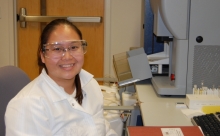
Major:
University:
Mentor(s):
Faculty Sponsor(s):
Faculty Sponsor's Department(s):
Project Title:
Project Description:
Narcolepsy is a neurological sleep disorder where current diagnoses include various sleep tests whose results rely on the analysis of the test administrator. Due to the subjective nature of these tests, the goal of this endeavor is to create a narcolepsy-specific quantitative diagnostic assay to replace current tests. Narcolepsy is suspected, but not proven, to be an autoimmune disease. Although narcolepsy is known to be caused by the loss of hypocretin-secreting neurons, the mechanism behind the loss is unknown. A recent increase of H1N1 influenza vaccine-associated narcolepsy cases in Scandinavian children has led to the hypothesis that a component of the vaccine increases the immune response of vaccinated patients to a pathogen, leading to autoimmunity. Furthermore, antibodies against H1N1 influenza nucleoprotein, which occur in vaccine-associated narcolepsy cases, have been shown to cross-react with the hypocretin receptor. The goal of my summer project is to compile two peptide repertoires, one binding to narcolepsy-specific antibodies and another to control patient antibodies. Using bacterial-display peptide libraries and magnetic selection, we sorted for peptides that bind to patient antibodies. We then determined the sequences of antibody-binding peptides using next-generation sequencing and applied bioinformatic algorithms to search for disease-specific peptide mimotopes. Based on the results of previous experiments employing this method, we believe the results of this project will produce a narcolepsy-specific peptide repertoire that binds significantly more to narcolepsy antibodies than control antibodies. In the future, we plan to create 2nd generation peptide libraries and test them for sensitivity and specificity.
